1884-85 Takeover
-
Swearing banned at Muir Park
-
Willie Paul makes his debut
-
Partick and Partick Thistle come together
The season began poorly for Thistle, with a 4-2 win over Morton the only positive result in an opening month which saw two 1-4 defeats at the hands of Dumbarton at Boghead and St Mirren at Westmarch, and the permanent relocation of Andrew Duff to Edinburgh in a move which many assumed would see the end of his time with Partick Thistle.
The match at Dumbarton saw Thistle take a one goal lead after a visiting supporter shouted “a safe thing today boys”. However, with guest players Inglis and Maitland from Rangers, Thistle lost the game. The match against St Mirren was the opening match at the Paisley club’s new grounds, described as “splendid” by the Scottish Athletic Journal, and the hosts must have been disappointed with the showing of their popular visitors.
These early games had seen several of Thistle’s top players missing, although the SFA Annual recognised the talent in the Thistle team.
Andrew Duff
A sterling good goalkeeper, possessed with all the requisite qualities of a first class man; will yet gain the high honours he deserves.
Peter Miller
Brilliant half-back; one of our best.
John Beattie
Has been a splendid half-back for years; excellent tackler, and very judicious in placing the ball to his forwards.
Thomas Paterson
Good centre forward; passes very unselfishly; has good weight, and plays with great dash. Played against Birmingham in 1879-80, and against Sheffield in 1884.
Duff and Paterson had been missing, but they were both back in the team for the first big game of the season – a tough Scottish cup tie against Third Lanark at Cathkin Park – along with Beattie, but without regular backs Brown, injured against St Mirren, and Hendry, also injured. Thirds scored within five minutes but an equaliser was forthcoming when the home goalie allowed the ball to slip through his hands after work by Ewing and Miller. The home side then took over and had two goals disallowed as well as scoring two that counted before half-time. Thistle scored another scrambled goal in the second half but the home side held on to win. The Scottish Athletic Journal reported on what they saw as one of “the hardest battles ever fought at Cathkin, Partick Thistle have never played a pluckier or harder game”. However, the Scottish Umpire saw the game differently, and reasoned that “if the Partick Thistle forwards had concentrated more on the ball than the man they would have had more success”. Nevertheless, all reports stated that the visiting fans outshouted the home fans and assisted their team greatly.
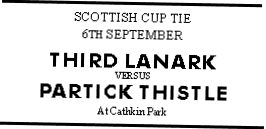 Aitken of Blackburn Rovers was a guest and filled in one of the vacant back positions, with Hendry back in the other, as Queen’s Park visited Muir Park. The game was even in the first part of the game, with Jerry Suter scoring for Thistle. However, the game ran away from the home team and Queen’s Park ended the game 5-1 winners. Criticism was again raised in the press of Thistle physical approach. “Partick Thistle will never play a good game if they continue more attention on opponents than on the ball.”
Aitken of Blackburn Rovers was a guest and filled in one of the vacant back positions, with Hendry back in the other, as Queen’s Park visited Muir Park. The game was even in the first part of the game, with Jerry Suter scoring for Thistle. However, the game ran away from the home team and Queen’s Park ended the game 5-1 winners. Criticism was again raised in the press of Thistle physical approach. “Partick Thistle will never play a good game if they continue more attention on opponents than on the ball.”
In the aftermath of the Scottish Cup disappointment Thistle had made an official protest to the SFA on the grounds that the pitch had been marked with lines instead of the usual flags, and also that a crowd encroachment had stopped the game and made the game difficult. The home club stated that the game had not been stopped, while the referee’s report stated that time had been added on for the crowd spillage. Thistle had their 10 shillings bond returned as the committee did not believe that the protest had been of a frivolous nature, but the appeal was unsuccessful.
Incidentally, it became apparent later in the year that all the players who represented Third Lanark had been unregistered, and had this been part of the protest then the complaint would have been upheld. Partick Thistle had not been aware of this fact – the SFA secretary had been aware of the non-registration: however, he had not been questioned on that particular topic. Perhaps this puts into context the view that the SFA is bureaucratic in the late 20th century.
With the on-field difficulties, it was interesting to read in the Scottish Umpire that swearing at Muir Park had been banned, prior to the match against Queen’s Park. “… awe-inspiring notices threatening you with expulsion, even if you breathed a wee, wee one. This was a hardship for many with such an important task before Thistle. The fair sex turned up in big numbers. Football in Partick is infectious although autumn fashions may have something to do with it.”
The disappointing start to the season continued with a 1-1 draw against Port Glasgow Athletic at Clune Park, Robertson scoring the goal, before more bad luck off the field deprived the club of Beaton’s forward presence for the next few months.
Despite the lack of results on the field, individually players were recognised for their abilities, and five – Duff, Hendry, Beattie, Suter and R.Robertson – were selected to play in the Glasgow FA side against Dunbartonshire. Duff had a brilliant game, despite losing three goals, while at the other end Robertson and Jerry Suter (2), scored Glasgow’s goals in a 3-3 draw.
This recognition may have been the turning point in the season for the side, for after losing 2-3 to Falkirk, while missing the five players on representative duty, a run of results was finally put together. Incidentally, Falkirk scored a fourth goal against which the Thistle players appealed. The Falkirk team gave up their claim in order to get the Thistle players to resume the game.
A rematch for some of the players against the Renton representatives of the Dunbartonshire team took place the following week at Muir Park. Renton, unbeaten so far in the season, took the game to a 2-2 final score. Reports that Thistle were lucky when a Renton player had to retire prior to half-time seem well-placed until it was revealed that he was injured “attempting to go for Duff”.
Three months into the season, and the third win was recorded, away to Our Boys of Dundee. Thistle scored two goals, which the home team claimed were offside. The referee allowed both. Both teams stopped play and after a discussion the ref left the pitch, offended by the criticism he received. The game continued with the two remaining umpires officiating, and Thistle won 5-2.
Match officials were again affected, but not immediately involved in the following game, at Muir Park against Johnstone. With no referee appointed prior to the game, a Thistle goal was appealed against, and Thistle waived their goal claim. Maitland, Miller and Robertson scored later in the game to win 3-1.
The big debate of the time was professionalism. The English FA were close to recognising that payments to players were inevitable, while the Scottish game was still officially strictly amateur. Indeed shortly before Thistle were due to play Heart of Midlothian at Tynecastle the Edinburgh club had been 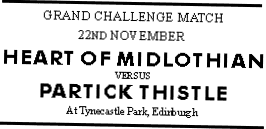 accused of professionalism and had been ejected from the SFA. The game went on, with Andrew Duff turning out for Thistle. Thistle played well, Duff repelling the Hearts attacks, while Suter and Brown put the visitors 2-0 ahead before Hearts equalised. Shortly before half-time Robertson scored Thistle’s third – a goal which was disputed despite the referee allowing the goal. The game was stopped for fifteen minutes to allow a dispute involving the referee, umpires, players and supporters to be resolved. The second half was rough, with Hearts ultimately levelling the game at 3-3.
accused of professionalism and had been ejected from the SFA. The game went on, with Andrew Duff turning out for Thistle. Thistle played well, Duff repelling the Hearts attacks, while Suter and Brown put the visitors 2-0 ahead before Hearts equalised. Shortly before half-time Robertson scored Thistle’s third – a goal which was disputed despite the referee allowing the goal. The game was stopped for fifteen minutes to allow a dispute involving the referee, umpires, players and supporters to be resolved. The second half was rough, with Hearts ultimately levelling the game at 3-3.
The unofficial Partick/Govan championship remained north of the river after Pilgrims were dispatched 2-0 at Copeland Park. Thistle began the game with ten men, winning the game with goals from Suter and Miller.
 Beaton made a return to the team after his injury of three months previous, as Thistle made a poor start to the home match against Pollokshields Athletic, 2-0 down early in the game. Tom Maley scored three goals before Jerry Suter scored the fourth to win 4-2.
Beaton made a return to the team after his injury of three months previous, as Thistle made a poor start to the home match against Pollokshields Athletic, 2-0 down early in the game. Tom Maley scored three goals before Jerry Suter scored the fourth to win 4-2.
As had been widely expected, the English FA recognised the inevitable professionalism that was seeping through the game, and as also was expected, began a drain on Scottish talent, as players headed south to seek their fortunes. John (Jack) Beattie, a former captain of the club from the earliest days, was the first to make the move from Partick to England, joining Burnley along with five players from Kilmarnock.
Local rivals Partick travelled to play Dundee Harp in mid December and were embarrassed, losing 0-6. The following week Thistle took the road to Dundee to play the same team. 7,000 spectators turned out to watch a fine game, ending 4-4, with goals from Maley, Christie (ex of Bolton) and Robertson. Tom Maley’s excellent forward play was particularly remarked on by the local papers. The game ended in dispute, Thistle claiming a fifth goal, Harp countering that the effort had gone over the bar, and the referee unable to decide. The game was held up for more than five minutes as heated discussions went on until Thistle backed down. There was no doubt that Thistle were the preeminent team in the burgh, and Partick were second best.
On that same day Glasgow beat a London select 6-2, with Andrew Duff having little to do in goals.
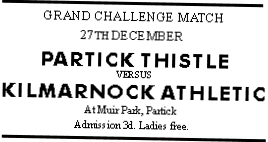 Following a 2-1 home win over Kilmarnock Athletic, Thistle’s New Year tour travelled to Dundee, where they had become regular visitors in the latter part of 1884. Our Boys on the 2nd January 1885 were the first opposition of the tour, and despite good play from the home side, Thistle emerged 2-1 winners. Athletic News reported that Thistle “played their usual neat passing game”.
Following a 2-1 home win over Kilmarnock Athletic, Thistle’s New Year tour travelled to Dundee, where they had become regular visitors in the latter part of 1884. Our Boys on the 2nd January 1885 were the first opposition of the tour, and despite good play from the home side, Thistle emerged 2-1 winners. Athletic News reported that Thistle “played their usual neat passing game”.
Because of injuries, Thistle were under-strength against Strathmore the following day; George Mackay and Brown being unable to play because of injury, and Maley having to return home because of a domestic problem. Local players filled some of the spaces, while secretary Hastie replaced Mackay and promptly broke his leg in the game. After two 30 minute halves the game ended 1-1.
The reserves played two games in the area too. A 1-1 draw with Angus Athletics in Forfar was followed by a match in Arbroath when McDonald fractured his leg.
Further problems occurred midway through the next game, against Port Glasgow Athletic, when Hendry had to leave the field with Thistle a goal up from Maley. The defender came back on, though, and Thistle won the game 2-1.  However, the loss of players did allow the debut of the player who was to become Thistle’s first star. William Paul was to grace the Thistle jersey for many years despite many attempts to tempt him to leave the club he adored.
However, the loss of players did allow the debut of the player who was to become Thistle’s first star. William Paul was to grace the Thistle jersey for many years despite many attempts to tempt him to leave the club he adored.
Maley (regularly spelt Mailley) had been in top form for Thistle, and had netted five times in seven games for the club since his first game in November. Mid-January saw him called up for a representative game for Glasgow against Birmingham, a 2-2 draw. Unfortunately for Thistle, Maley left the club just two weeks later to take up a teaching post in London.
There were other comings and goings at Muir Park – long-serving secretary Alex Rose announced his intention to resign his post, prior to a move abroad. In recognition of his work the club was to present him with a gift. Andrew Duff, the goalkeeper who had been jumping from coast to coast, playing with Thistle and his east coast club Heart of Midlothian, turned out for fellow Edinburgh club St Bernards, following Hearts expulsion from the SFA.
However, new players were making their way to Muir Park. A.Robertson had joined from Cowlairs, while three had joined from Partick, despite the local rival’s good form throughout the season. Kerr, and two players called Marshall had made the move along Dumbarton Road.
Willie Paul was to score the first of many goals for the club in a game against Kilmarnock Athletic at Muir Park at the end of January. Andrew Duff, “the famous goalkeeper”, also turned out for Thistle, playing as a forward, and scoring the first goal as Thistle won 5-0.
Following Maley’s departure for London, Thistle had a tough match against Pilgrims which they won 1-0. However, it was the next match which again lifted the interest of the footballing public in Partick. 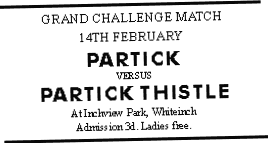 There had been press stories that the local derby would not be played this season because “the partisans of both teams were so excitable that they often came to blows, and in the interests of public peace, the clubs had decided not to meet in the meantime”. When the game was played, on St Valentine’s Day 1885, there was almost a massacre, as Thistle coasted to a 4-1 win. Ex-Partick man Marshall scored the first goal, while Jerry Suter scored two in a scrappy game. John Boag was Partick’s best player.
There had been press stories that the local derby would not be played this season because “the partisans of both teams were so excitable that they often came to blows, and in the interests of public peace, the clubs had decided not to meet in the meantime”. When the game was played, on St Valentine’s Day 1885, there was almost a massacre, as Thistle coasted to a 4-1 win. Ex-Partick man Marshall scored the first goal, while Jerry Suter scored two in a scrappy game. John Boag was Partick’s best player.
Disappointment followed after a visit to Edinburgh saw a 1-6 defeat recorded after the team arrived with only nine players. Substitutes were obtained in Edinburgh, but the scoreline could have been worse had the form of Andrew Duff not been as good.
A further poor result was recorded in the next game as Pilgrims took revenge for some heavy defeats. In a match played at Kinning Park, courtesy of Rangers, the referee disallowed two goals as Thistle lost 1-4.
This defeat by Pilgrims was particularly disappointing, as it appeared that Thistle were denied a place in the Glasgow Charity Cup on the strength of the defeat by the Govan team.
Thistle had long desired the chance to play at the top level, and the Charity Cup would have given a great deal of prestige to the club. However, they had to content themselves with a fixture at Muir Park against Scottish Cup holders Renton, having drawn 2-2 earlier in the season. The visitors began well and were leading 1-0 at half-time, but this scoreline appeared to spur Thistle on. Early in the second half Marshall scored after a Johnstone run, before a team move involving Paul, Miller, Robertson ended with a Miller header scoring the winner for Thistle. The Scottish Umpire described the scenes: “The scene that ensued almost baffles description – men, women and children giving vent to one exultant yell.”
This historic victory again sparked calls for Thistle to be included in the Charity Cup. A letter was published in the Glasgow News suggesting that Thistle should be included, although there were other letters promoting other teams. However, the “On The Wing” column in the Scottish Umpire was positive: “The Partick Thistle followers are willing to give any odds their team could lick anything that’s in the Charity Cup … the gate at Muir Park [against Renton] was the largest this season and combined with the result of the match put every Partickonian in the best of temper … now that Thistle have drawn once with Renton and beat them 2-1 there must be something said in the extenuation of their claim to a place in the Charity Cup … I feel that in their present form they could just about knock holes in some more fancied teams”. However, the Cup committee again snubbed Thistle.
Peter Miller joined from Dumbarton, and he helped the team to two wins – over Hearts and St Mirren at Muir Park (2-1 and 1-0 respectively), before a 1-6 defeat away to Arbroath at Easter.
The annual club dance took place, reportedly the best in the club’s history, and as was traditional, several players were “fatigued by their exertions” of the previous night, and changes were made for a match against Falkirk at Muir Park the following day. Despite this Thistle ran out 5-0 winners.
A rivalry had built up between the teams of Thistle and Pilgrims of Govan over the season, with 2 wins (1-0 and 2-0) and a defeat (1-4) being recorded. A decider, at Inchview, was marred by assertions of rough play by the defeated Pilgrims’ players; denied by Thistle. The first half was even despite Miller and Brown being absent from Thistle. However, the second period saw Thistle push ahead and win the game 4-1 to confirm the superiority of Partick over Govan.
Thistle had not been given the chance to match themselves against Rangers for two years – allegations that the Govan side were afraid to play were rife the previous season – but in late April Rangers sent an experimental side to Muir Park. The visitors revealed that seven of their players refused to play in case of injury – a statement picked up by the Scottish Athletic Journal, who thought this an unreasonable comment and pointed out that although Rangers had an experimental side out, only one could not be regarded as not a regular. Thistle were also without R.Brown and J.Marshall, but they took the lead after just twenty seconds through Johnstone. Mackie, Robertson (twice) and Miller scored in the second half to provide Thistle with a 5-2 win.
Allegations surfaced in the press of rough Thistle play in the game against Rangers. However, the Scottish Umpire thought that the referee had given a satisfactory performance, so the statements may have been sour grapes.
Relations between Partick clubs and their neighbours across the water in Govan had been strained for some time, and moves were begun to repair the damage done. Representatives from Partick, Partick Thistle, Pilgrims, Whitefield, Linthouse, Elgin, Elm, Rosevale, Westbourne and Partick Rovers met to form the Partick and Govan FA. The first event was a representative match between Govan and Partick. Unfortunately, several members of Partick Thistle were assaulted by “Govanites” after the match.
The last ever match between Thistle and Partick took place in early May at Muir Park, and the customary Thistle win was forthcoming. Johnstone, Marshall (twice) and Mackay scored in a 4-1 win.
Off the field, events had been hectic, although the press were unable to explain why. However, there were reports of great dissatisfaction amongst the club members, prior to the Annual General Meeting. Josh Halley was to be opposed by Hastie as club President, while Alex Rose had been persuaded not to move abroad, and to stay with the club. At the AGM dissent was shown by the members in the form of “strong speaking and cutting innuendoes”, followed by a vote in which President Halley kept his position.
- President Josh Halley
- Vice President J.Robertson
- Treasurer John Weir
- Hon. Secretary Mr Smith
- Match Secretary C.McQuarrie
- Committee W.Livingston, A,Maitland, Alex Rose, A.Brown, R.Brown, A.Leckie
Mere weeks after the AGM, vice-President Robertson, left the club, emigrating to America.
The reasons for the dissension at the AGM can only be speculation, but two weeks following the AGM it was announced that Partick FC had gone defunct. Immediately it was also announced that Thistle would directly move to Partick’s ground at Inchview, as they would be expecting bigger crowds. They also hoped to make Inchview as famous as Muir Park. Members of Partick had been joining the Muir Park club throughout the year, while an ex-Partick man John Boag would soon become President of Partick Thistle. Lovers of conspiracy theories might sense an attempted take-over bid, although it would be difficult to state if it was initiated at Muir Park or at Inchview.
None-the-less, it would be a stronger combined Partick team that would take on Scotland, and England and Ireland, after the summer break.
5 Responses to 1884-85
Leave a Reply Cancel reply
Categories
- Miscellaneous (16)
- Other clubs (15)
- Players (26)
- Thistle – early years (48)
- Thistle – general (5)
Football history links
- Ayr United archive
- Bill Shankly
- Falkirk Historian
- Gallant Pioneers – Early history of Rangers
- Glasgow Herald archive at Google
- Hibernian
- Hibernian Historical Trust
- London Hearts
- Partick Thistle history archive by StuTheJag
- Rangers History
- Scottish Football Historical Archive
- Scottish Football Museum
- Scottish Sports History
- ScottishLeague.net and forum
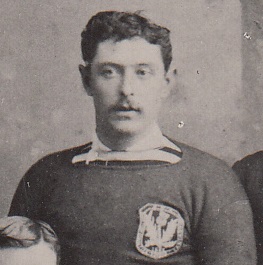

My great grandfather was peter miller hb for Patrick thistle born 1858 I would be grateful for a photo and some information on him
Hi Sally
Peter played 4 games for Partick Thistle in 1884-85. I’m afraid that’s all the information I have on him. No photos have ever been seen, but you never know what might be out there.
Niall
Hi Sally
I did manage to source a picture of Peter Miller. You’ll find it in the article above.
Thanks to William Sheridan and Andy Mitchell for sharing it.
Niall
Thank you all very much the photo is brilliant. Regards Sally Gibbon.
Hi everyone. He was my great great grandad as well! Never expected to find a photo of him. Amazing! And capped for Scotland 3 times.
He died in Hartlepool which is where I was born. I live in Australia but he still has descendants in the North East.